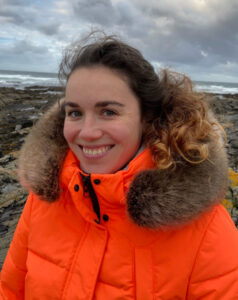University of Oxford
11a Mansfield Rd
OX1 3SZ
UK

Harriet Bartlett
Background
Research Interests
Harriet researches the best ways of farming for people, the planet and the animals we farm. Her research interests were sparked by concerns about tradeoffs in our farming systems – it is commonly perceived that systems that use less land (and so are better for biodiversity) perform worse in other ways. Eg. they have higher carbon footprints, use more antimicrobials and have poorer animal welfare. She found that these tradeoffs were largely assumed – very few systems and externalities had been empirically and systematically tested. Her work aims to fill these gaps; to identify tradeoffs among externalities where they exist and where they don’t.
Her work applies interdisciplinary methods to enable informed decision-making on the types of farm we should be promoting. She works in UK and Brazilian livestock systems, specialising in pig and cattle systems. She specialises in making empirical and systematic comparisons of outcomes for the climate, biodiversity, animal welfare and emerging infectious disease risks.
Current Research
Harriet visits farms to collect data and carry out assessments to compare alternative production systems. She will be working with UK and Brazilian livestock farmers to identify the best ways of farming and helping farmers to reduce their negative externalities.
Brief CV
2017-2022 PhD Candidate in Sustainable Food Systems, University of Cambridge
2017 Research Assistant in Red Meat Climate Mitigation, CSIRO
2016 Research Assistant in Sustainable Grazing, University of Cambridge
2013-2016 1st class BA in Preclinical Veterinary Medicine, University of Cambridge
Papers
- Balmford, A., Amano, T., Bartlett, H., … Eisner, R. (2018). The environmental costs and benefits of high-yield farming. Nature Sustainability,1(9),477–485. https://doi.org/10.1038/s41893-018-0138-5
- Mayberry, D*., Bartlett, H*., Moss, J., Davison, T., & Herrero, M. (2019). Pathways to carbon-neutrality for the Australian red meat sector. Agricultural Systems, 175(May), 13–21. https://doi.org/10.1016/j.agsy.2019.05.009 *These authors contributed equally
- Bartlett, H. (2019). Livestock, antibiotics and greenhouse gas emissions. Book chapter in Planetary Health: Human Health in an Era of Global Environmental Change, 131–139. https://doi.org/10.1079/9781789241655.0131
- Petrovan, S. O., Aldridge, D. C., Bartlett, H., Bladon, A. J., Booth, H., … Sutherland, W. J. (2021). Post COVID-19: a solution scan of options for preventing future zoonotic epidemics. Biological Reviews, 1, brv.12774. https://doi.org/10.1111/BRV.12774
- Geldmann, J., Alves-Pinto, H., Amano, T., Bartlett, H., Christie, A. P., … Balmford, A. (2020). Insights from two decades of the Student Conference on Conservation Science. Biological Conservation, 243, 108478. https://doi.org/10.1016/j.biocon.2020.108478
- Kalmar, … Bartlett, H., … & Holmes, M. A. (2021). HAM-ART: An optimised culture-free Hi-C metagenomics pipeline for tracking antimicrobial resistance genes in complex microbial communities. PLoS Genetics, 18(3), 2021.08.16.456459. https://doi.org/10.1371/JOURNAL.PGEN.1009776
- Bartlett, H., Holmes, M., Petrovan, S., Williams, D., Wood, J. L. N., & Balmford, A. (2022). Understanding the relative risks of zoonosis emergence under contrasting approaches to meeting livestock product demand. Royal Society Open Science https://royalsocietypublishing.org/doi/10.1098/rsos.211573
